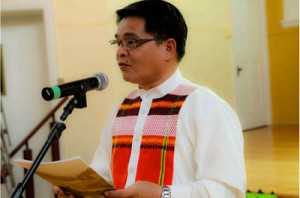Remembering the Land
Remembering the Land
Fr. Rex Reyes on foreign interests in Ph mining, human rights and indigenous peoples’ resistance
By Rick Esguerra
Philippine Solidarity Group-Toronto
November 1, KAIROS Ecumenical Justice Initiatives held a screening of the documentary Remember the Land: Global Ecumenical Voices on Mining, at the Loretto College in Toronto.
Binnadang-Migrante (Cordillera people’s organization in Toronto) held its first anniversary celebration, Nov. 3, at the Downsview United Church, a highlight of which was the showing of a film on human rights in the Philippines.
On both occasions, distinguished guest Fr. Rex Reyes, general secretary of the National Council of Churches of the Philippines, spoke on the burning issues of human rights, foreign interests in the extractive industries (mining in particular) and the struggle of Philippine indigenous peoples for land, rights and livelihood. Following is his presentation.
————————————-
Let me first thank KAIROS for the invitation to this activity and the Primates’ World Relief and Development Fund (of the Anglican Church in Canada) for even making it possible for me to respond favorably to the invitation.
I always carry with me a list of names. It is a list that is burdensome and begs for more shoulders. It is a list that grows longer each week. In this list are the names of indigenous peoples and farmers, young and old, men and women, whose blood cry out from the ground for justice. To others this list is what it is – a list, a statistic. But for people of faith, this list is a reminder of the questions God continues to ask: “Where is your brother/sister?” and “What have you done? Behold, your brother’s/sister’s blood cries out from the ground.”
From where I sit, it is a daunting task to reiterate condemnation and prayer or appeal for justice each time a name or names are added to the list.
Lifting up from the film we just saw, let me underscore a few significant updates from the Philippines.
On November 12, advocates of human rights and the rights of indigenous peoples will launch a campaign network to “Stop the Killings of Indigenous Peoples”. This recourse is a response to a disturbing trend where indigenous peoples have largely become the targets of extrajudicial killings.
Since March 2012, a total of 28 indigenous persons were killed. Of the 28 indigenous victims – four were women and four were children. The latest was on October 18 when a mother and her two sons were massacred by elements of the 27th IB of the Philippine Army in Mindanao. Failing to find the father whom they alleged was a rebel leader, they killed the members of his family in what they described was a “legitimate encounter”. The father’s only fault perhaps was his consistent and militant opposition to large-scale mining in the mountains inhabited by his tribe. Latest report is that the assailant-soldiers will be hailed to court – the foot soldiers, not their superiors.
We also seek this recourse because of the failure of the government to address these issues and bring the perpetrators to justice.
Indigenous peoples are at the forefront in the defense of our patrimony, much more so that their ancestral lands are the prime targets of massive resource extraction. While the number of local governments opposed to big mining firms is growing, the greater concern is that anti-large-scale mining activists and indigenous people are faced by the might of the national state security forces out to quell any militant opposition to these massive resource extraction activities in the name of the fight against terror. The anti-insurgency policy of the government through Oplan Bayanihan, for all it banners, gives teeth to a repressive intention that in its implementation does not make any distinction between armed combatants and civilians. The toll is heavy and the consequences repugnant.
In a study made by a colleague in the Philippines, eleven mining companies owning 39 properties in the Philippines are listed in the Toronto Stock Exchange while six companies with 28 properties are listed in the Toronto Stock Exchange as of October, 2011. By now, most of us will know of the poor record of Canadian mining firms in countries where they are.
The aggressive mining pursuits, backed up by a mining policy tilted heavily towards foreign investment and the opposition of indigenous peoples and activists has resulted in brazen human rights violations in all its forms – harassments, internal dislocations and killings. These must stop. The campaign to realize this has to go beyond the Philippines.
In this light, may I affirm the calls of the film we just saw. I wish that there can be an international ecumenical network against large-scale resource extraction in the Philippines and in Latin America. We also urge our partners in Canada to help us lobby in the Canadian parliament to call the Philippine government’s attention to human rights violations resulting from opposition to these anti-people and anti-environmental practices. It is also important for Canadian citizens and Filipino-Canadians to know the truth. Forums like this play an important role in this process. As a concrete response, I urge you to sign a petition being circulated in this hall right now calling the president of the Philippines to address the latest violations – that of the killing of the mother and her children and the latest being the attempt on the life of a mining activist in Mindanao.
Stop the killing of the stewards of God’s creation. Stop the plunder of patrimony. Protect human rights.
Let us go on to learn what Jesus means when he says: “I desire mercy and not sacrifice”

Comments (0)